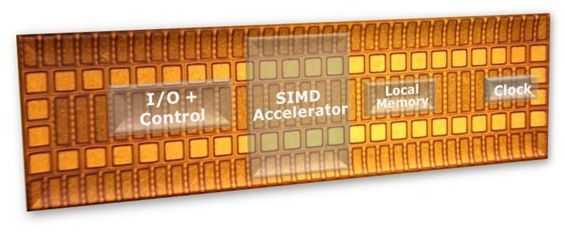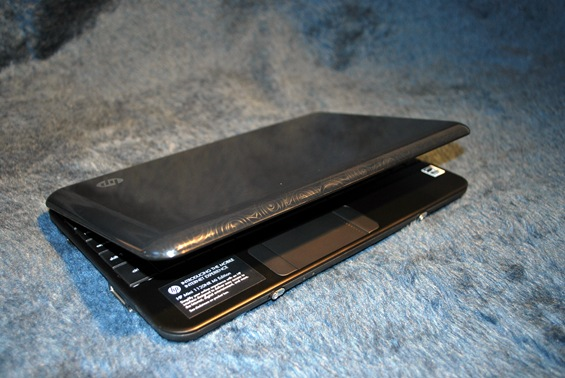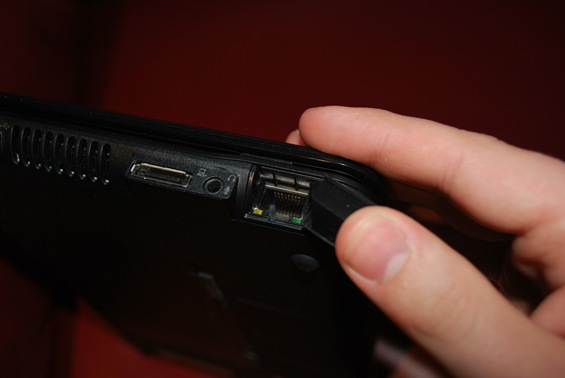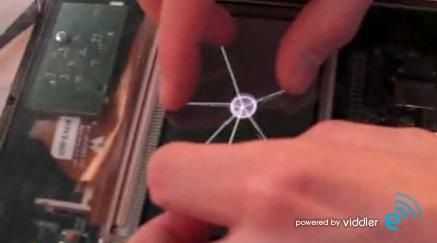
Posted on 19 March 2009
 SlashGear is reporting that Intel is working on a version of something called an SIMD accelerator that will help increase graphical performance on future mobile devices. There isn’t too much to go on with the small amount of information that Intel released, but apparently the SIMD (Single Instruction, Multiple Data) accelerator that they are working on uses 10x less power than current SIMD accelerators use, making the new SIMD accelerator practical for use in handheld devices, particularly MIDs, as Intel mentions.
SlashGear is reporting that Intel is working on a version of something called an SIMD accelerator that will help increase graphical performance on future mobile devices. There isn’t too much to go on with the small amount of information that Intel released, but apparently the SIMD (Single Instruction, Multiple Data) accelerator that they are working on uses 10x less power than current SIMD accelerators use, making the new SIMD accelerator practical for use in handheld devices, particularly MIDs, as Intel mentions.
The concept of Single Instruction, Multiple Data seems somewhat contradictory to the current Atom processors which use in-order execution, but then again, I can’t claim to be an expert on CPU architecture, so these things may be unrelated. It sounds like Intel’s newer, less power hungry SIMD accelerator could be used in conjunction with their upcoming Moorestown platform.

Posted on 26 February 2009

I think I definitely saved the best for last. The HP Mini 1000 is a beautiful unit by anyone’s standards. Combine that with the fact that you can buy a version of the Mini 1000 MIE direct from HP starting at $280, and you should be impressed.
Take a look at the hardware tour:

Left (left to right): A/C plug, USB 2.0, vents, HP accessory connector, standard headphone jack, ethernet port (covered by rubber flap).

Front: Power slider, HDD/battery LED indicators, wireless slider.

Right: SD slot, USB 2.0, recessed USB 2.0 (under cover).

Back: Nothing here but hinge.

Close up of the ethernet port under the rubber cover.
(Continue reading on page 2…)

Posted on 19 February 2009

Jkkmobile points out an interesting video from Engadget that shows some interesting multi-touch demos on a resistive touchscreen. Have a look at the video embedded below, but be sure to stick around for some thoughts below.
The demos are definitely neat, but I’m a very big proponent of capacitive touch technology, not because of multi-touch, but because of its consistent recognition of input. Multi-touch and the ability to do gestures is great, but I would argue that it is not the best part of capacitive touch technology. So they have managed to port the multi-touch facet of capacitive touchscreens over to resistive touchscreens, but they stick lack the consistent detection of input. Nothing is more annoying to me than having to click on one item several times because it is easy for a resistive touchscreen to either miss or misinterpret your input. It really ruins the touchscreen experience. Low pressure input resistive screens help to alleviate this to some degree but the issue still remains. Capacitive touch’s ability to extremely consistently recognize touch input is what makes it possible to have a viable on-screen keyboard on a device the size of the iPhone. I’ve tried many other resistive touch phones with OSKs, and the experience is almost embarrassing to the hardware.
As for the pressure sensitivity of the demoed screen: The way it was described is that it recognizes how much pressure you are putting on the screen by how much contact there is with the surface of your finger. If this is the correct explanation of how the technology works, then pressure sensitivity will not be able to be measured with a stylus. When you apply more pressure to a surface with your finger, the skin around the bone presses down with a larger surface area, this obviously doesn’t occur with the tip of a stylus.
This is definitely good for resistive touchscreens and a jump forward for devices that will continue to use them, but in many cases I still feel like capacitive touch offers the best experience.
 SlashGear is reporting that Intel is working on a version of something called an SIMD accelerator that will help increase graphical performance on future mobile devices. There isn’t too much to go on with the small amount of information that Intel released, but apparently the SIMD (Single Instruction, Multiple Data) accelerator that they are working on uses 10x less power than current SIMD accelerators use, making the new SIMD accelerator practical for use in handheld devices, particularly MIDs, as Intel mentions.
SlashGear is reporting that Intel is working on a version of something called an SIMD accelerator that will help increase graphical performance on future mobile devices. There isn’t too much to go on with the small amount of information that Intel released, but apparently the SIMD (Single Instruction, Multiple Data) accelerator that they are working on uses 10x less power than current SIMD accelerators use, making the new SIMD accelerator practical for use in handheld devices, particularly MIDs, as Intel mentions.


















